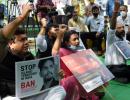In a significant verdict having wider ramifications, the Supreme Court on Friday held that mere membership of a banned organisation is an offence liable to be punished with imprisonment under provisions of the Unlawful Activities (Prevention) Act.

The top court said its three verdicts of 2011 pronounced by two-judge benches, which held that mere membership of a banned organisation will not incriminate a person unless he resorts to violence or incites people to violence and does an act intended to create disorder or disturbance of public peace by resorting to violence, "is not a good law".
It restored Section 3(5) of the Terrorists and Disruptive Activities (Prevention) Act, 1987 and Section 10(a)(i) of the UAPA, 1967, which made the membership of a banned outfit an offence, liable to be punished with two years imprisonment along with fine.
A bench of Justice M R Shah, Justice C T Ravikumar and Justice Sanjay Karol allowed the petitions filed by the Centre and the Assam government seeking a review of the three 2011 verdicts of the apex court on the ground that it will impact the sovereignty and integrity of the country.
"We hold that the view taken by this Court in the cases of State of Kerala versus Raneef, Arup Bhuyan versus Union of India and Indra Das versus State of Assam (all 2011 verdicts) taking the view that under Section 3(5) of Terrorists and Disruptive Activities (Prevention) Act, 1987 and Section 10(a)(i) of the Unlawful Activities (Prevention) Act, 1967, and reading down the said provisions to mean that over and above the membership of a banned organisation there must be an overt act and/or further criminal activities and adding the element of mens rea are held to be not a good law," it said.
The bench held that "when an association is declared unlawful by notification issued under Section 3 which has become effective of sub-section 3 of that Section, a person who is and continues to be a member of such association is liable to be punished with imprisonment for a term which may extend to two years, and shall also be liable to fine under Section 10(a)(i) of the UAPA, 1967".
The top court said any other decisions of the High Court taking a contrary view are held to be "not a good law" and are specifically overruled by this judgment.
"Consequently, the review applications filed by the Union of India and the State of Assam are hereby allowed," it said, and directed that the main appeals be placed before the concerned bench for taking of such matters after obtaining the appropriate order from the chief justice.
The three-judge bench answered the reference made to it on August 26, 2014 by a two-judge bench while noting the submissions of the Centre that in the Arup Bhuyan case, this court has read down the provision to the detriment of the interest of the Union of India, when it was not party before it.
The top court on February 3, 2011, had acquitted suspected ULFA member Bhuyan, who was held guilty by a TADA court on the basis of his alleged confessional statement before the superintendent of police, and said mere membership of a banned organisation will not make a person a criminal unless he resorts to violence or incites people to violence or creates public disorder by violence or incitement to violence.
Similar views were taken by the apex court in two other verdicts of 2011 in Indra Das versus State of Assam and state of Kerala versus Raneef, where the bench relied upon the three US Supreme Court decisions which rejected the doctrine of 'guilt by association'.
The bench said as far as the reading down of Section 10(a)(i) of the UAPA by this court in the case of Arup Bhuyan is concerned, at the outset it is required to be noted that such reading down of the provision of a statute could not have been made without hearing or giving an opportunity to the Centre.
"When any provision of parliamentary legislation is read down in the absence of the Union of India, it is likely to cause enormous harm to the interest of the State. If the opportunity would have been given to the Union of India to put forward its case on the provisions of Section 10(a)(i) of the UAPA, 1967, the Union of India would have made submissions in favour of Section 10(a)(i) of the UAPA, including the object and purpose for enactment of such a provision and even the object and purpose of UAPA," it said.
The bench said it is true that it is ultimately for the court to interpret the law and/or particular statute, but the question is whether it can be done without hearing the Union of India. Referring to the 2011 verdicts, the bench said the court was only dealing with bail applications and the court should not have ventured to read down provisions under law, which was not challenged.
"Even otherwise, in absence of any challenge to the constitutional validity of Section 10(a)(i) of the UAPA, there was no question of reading down the said provision by this court. Therefore, in absence of any challenge to the constitutional validity of Section 10(a)(i) of UAPA, 1967, there was no occasion for this court to read down the said provision," it said.
It said, "In view of the above in all the three decisions, this court ought not to have read down Section 10(a)(i) of the UAPA, 1967 more particularly when neither the constitutional validity of Section 10(a)(i) of the UAPA, 1967 was under challenge nor the Union of India was heard."
Referring to the decisions of American courts in 2011 verdicts, the bench said this court ought to have considered the differences in the American laws and the Indian laws, more particularly the provisions in the Indian Constitution.
"By the aforesaid, we do not say for a moment that in a given case, the US Supreme Court decisions may not be taken into consideration and/or may not be guidance. Before following the American decisions, the Indian courts are required to consider the difference in the nature of the laws applicable in the respective countries," it said.
Justice Karol, who concurred with other two judges gave his own reasons on reliance of American court decisions, saying, "I may conclude that placing reliance therefore, on decisions rendered in a distinct scenario as well as a demonstrably different constitutional position, that too almost singularly, especially in cases which involve considerations of national security and sovereignty, was not justified."









